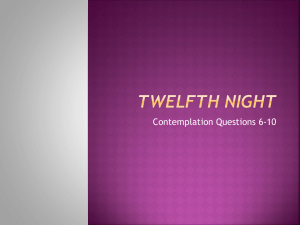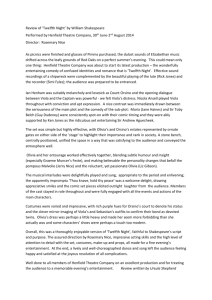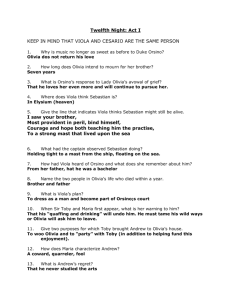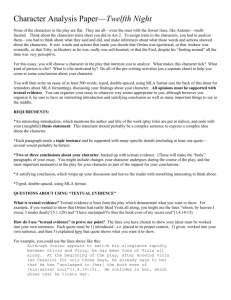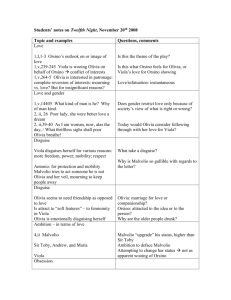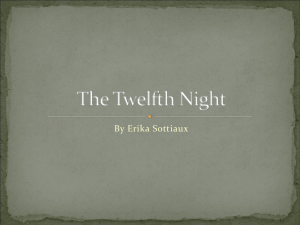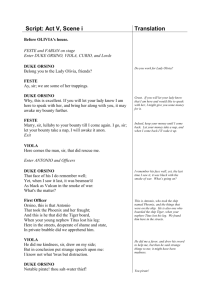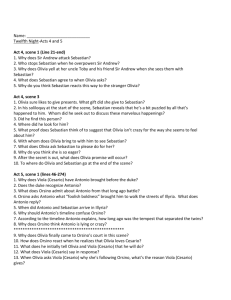The lines selected for analysis are from act V, scene I, lines 115
advertisement
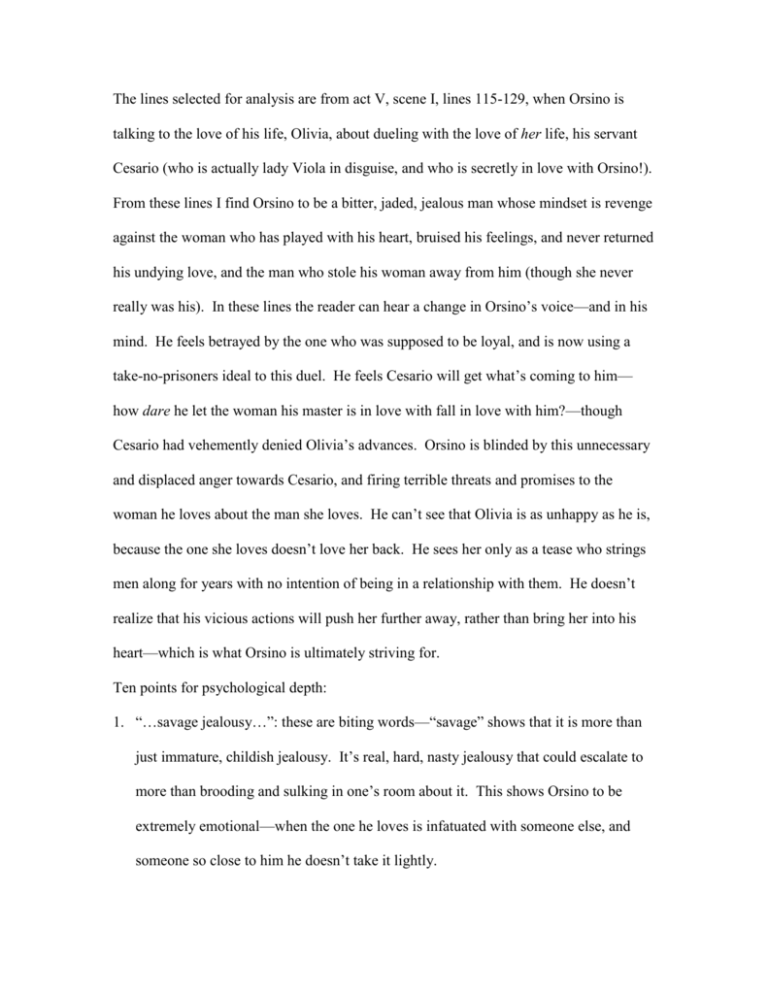
The lines selected for analysis are from act V, scene I, lines 115-129, when Orsino is talking to the love of his life, Olivia, about dueling with the love of her life, his servant Cesario (who is actually lady Viola in disguise, and who is secretly in love with Orsino!). From these lines I find Orsino to be a bitter, jaded, jealous man whose mindset is revenge against the woman who has played with his heart, bruised his feelings, and never returned his undying love, and the man who stole his woman away from him (though she never really was his). In these lines the reader can hear a change in Orsino’s voice—and in his mind. He feels betrayed by the one who was supposed to be loyal, and is now using a take-no-prisoners ideal to this duel. He feels Cesario will get what’s coming to him— how dare he let the woman his master is in love with fall in love with him?—though Cesario had vehemently denied Olivia’s advances. Orsino is blinded by this unnecessary and displaced anger towards Cesario, and firing terrible threats and promises to the woman he loves about the man she loves. He can’t see that Olivia is as unhappy as he is, because the one she loves doesn’t love her back. He sees her only as a tease who strings men along for years with no intention of being in a relationship with them. He doesn’t realize that his vicious actions will push her further away, rather than bring her into his heart—which is what Orsino is ultimately striving for. Ten points for psychological depth: 1. “…savage jealousy…”: these are biting words—“savage” shows that it is more than just immature, childish jealousy. It’s real, hard, nasty jealousy that could escalate to more than brooding and sulking in one’s room about it. This shows Orsino to be extremely emotional—when the one he loves is infatuated with someone else, and someone so close to him he doesn’t take it lightly. 2. “…savors nobly…”: there is some sick pleasure in enjoying what he is about to do. He can enjoy injuring or killing Olivia’s love, but he’ll make sure to do it with some grace. I think Orsino would see it as some kind of release—the ultimate punishment for the man who was supposed to be his servant and obey him forever. 3. “…since you to non-regardence cast my faith…”: here, Orsino obviously feels insignificant, as he is calling Olivia on her constant disregard for his approaches. He dislikes not having Olivia’s attention (though he really hasn’t had it for years, except for her to tell him to leave her alone)—but to make things worse suddenly this new guy waltzes in and get steals what Orsino thinks is rightfully his! 4. “…that screws me from my true place in your favour…”: “screws” is a harsh word for ‘taken,’ so once again the reader can see Orsino’s jealous, bitter personality come out. The problem with this quote is that Orsino thinks it’s his rightful place to be in Olivia’s favor, but he’s never been there and probably never will be. 5. “…marble-breasted tyrant…”: he’s basically calling Olivia a cold-hearted woman with no concern for other’s feelings. After years of pining for her he has been unsuccessful not because there’s a chance she doesn’t like him, but because she has no capacity to love, because she is an indifferent, remote person. Or to take the title of a recent song—and pardon the language—Olivia is a “Cold Hard Bitch”! 6. “…by Heaven, I swear I will tender dearly…”: Orsino swears to God—the highest promise one can make. From this eternal pledge the reader can be certain that he will follow through on what he is about to say. 7. “…I will tear out of that cruel eye…”: again, referring to Olivia’s cold-heartedness. And he will not just take Cesario out of Olivia’s life, he will “tear” him from her “eye,” a terribly violent image, almost reminiscent of the ‘an eye for an eye’ punishment system: he was hurt by Olivia, so he must now hurt Olivia. 8. “…sits crowned in his master’s spite…”: this is a very important point. From Orsino’s point of view, Cesario is a backstabber who violated the cardinal rule of any male relationship: don’t get involved with the other’s love interest. He thinks that Cesario is enjoying being with Olivia and seeing all the pain Orsino is in—when, in fact, it is the opposite. Cesario has repeatedly refused Olivia because he knows that Orsino would never forgive him, and also, he’s not interested in her! It would be a different story if they were together behind Orsino’s back and were caught, but that is not the case. I think Orsino sees Cesario ‘replacing’ him in Olivia’s life—stealing his place as ‘king’ in her heart—and enjoying every minute of seeing the man he once served in pain, below him, and wanting to be him (though that is not the case). 9. “…I’ll sacrifice the lamb I do love…”: Orsino is willing to “sacrifice,” not even just kill—“sacrifice,” his servant and loyal subject for the greater cause (his undying love). It’s interesting that he thinks of Cesario as the lamb that has to be forfeited— for something that he is innocent of and really has had no control over. 10. “…to spite a raven’s heart within a dove.”: here, Orsino is reinforcing what he has discovered Olivia to be—a woman who, from the outside, is sweet (though distant) and attractive, but secretly inside is cold, mean and callous. A lamb in sheep’s clothing. There is a lot of violent language in the ten points just made: words like “savage,” “screws,” “tears,” “spite,” and “sacrifice” show that Orsino will not take this situation lightly. He has seen what’s happened with Olivia, her falling in love with Cesario, and is about to literally attack him for what has happened. The person who is refuting this statement is Orsino’s servant, Cesario. In Orsino’s mind, Cesario is both the sacrificial lamb that has always been loyal to him, and the beast that is ruining his chances with Olivia. Cesario would say that his intention was never to hurt Orsino—the last thing he would want is to upset or displease his master. Cesario would say that he is not doing it out of spite—that he is not doing anything at all! Olivia may have proclaimed her love for Cesario, but Cesario wants nothing romantically to do with her—it is in fact Orsino who he (she) wants. I think Cesario would proclaim that true love does exist, that it is evident in the very situation they stand arguing about. From there, Cesario could continue claiming loyalty if he were to put Olivia down— because after all, she’s the one who kept rejecting his master all these years. If Orsino was more mad at Olivia for refusing him than he was at Cesario for ‘stealing’ her away from him (as he seems to be at the end of the speech), then I think it would be a good idea to swoop in when Orsino was angry, hurt and vulnerable, reveal her true identity to him, and they could all live happily ever after. If that doesn’t seem like a good idea, Cesario should keep pleading that he was never out to spite his master, and tempt him with the ‘vague knowledge’ that he knows someone who is honestly and truly in love with Orsino. Cesario should agree that Olivia did flit from one man to another—to embellish Orsino’s misshapen ideas that Olivia was once interested in him—but that he is not out to hurt Orsino. In fact, it’s quite the opposite: he refused Olivia because he knew it would upset his master. He wants to help Orsino get over Olivia, and the perfect way to do that is by encouraging him to look into his secret admirer. Cesario should tell Orsino that true love is out there for everyone and he should pursue this new individual (where true love is a guarantee), instead of being angry and crazed over a love that will never be returned. From the rest of the events in the play, I would say that Shakespeare agrees with Cesario and his way of thinking. Unlike Orsino, who thinks of love as his cruel mistress who has only brought him pain and sadness, from Cesario’s fictitious response one can see Cesario’ looks for the silver lining, and his optimistic views are ultimately rewarded: Olivia ends up with her true love look-a-like Sebastian, and Orsino finds happiness with his lady-in-disguise servant Viola. Though Orsino has experienced years of unhappiness pining for the nonresponsive Olivia, his life turns around when he finds out that Cesario is in fact Viola (and romantically interested in him). Maybe Shakespeare is saying that although man (or woman) goes through ordeals of not having their love accepted or returned (Viola, Orsino), or experiencing a personal tragedy (Viola, Sebastian, Olivia), ultimately everyone will find love and happiness (except for Malvolio, but his place in the play was to show Shakespeare’s distaste for Puritans, so it’s understandable that he would leave Malvolio with loose ends). From Orsino’s speech, the reader can see he is jaded after years of rejection, only to be one-upped by the one who was supposed to serve him. His language is violent, his threats just as much, and he is so blinded by his rage he can’t see that Cesario is basically innocent in all this, and it’s Olivia who has done him wrong. However, from the remaining events in the play, one can see that Shakespeare disagrees with Orsino’s pessimistic views of love, as he, in due course, matched everyone up for a happy ending.
